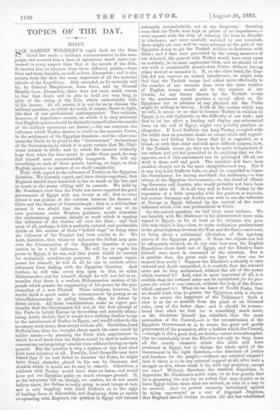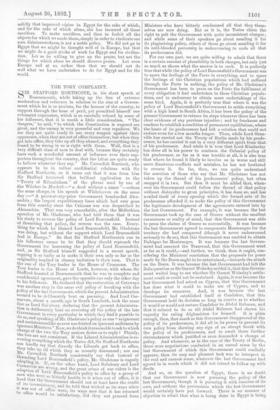TOPICS OF THE DAY.
EGYPT.
SIR GARNET WOLSELEY'S rapid dash on the Suez Canal has made a brilliant commencement to his cam- paign, and secured him a base of operations much more con- venient in every respect than that at the mouth of the Nile. It enables him to advance from three different points,—from Suez and from Ismailia, as well as from Alexandria ; and it also secures from the first the most important of all the material objects of the Expedition. Ably seconded, as he certainly will be, by General Macpherson, from Suez, and by General Hamley from Alexandria, there does not seem much reason to fear that Arabi will be able to hold out very long, in spite of the rising of the Nile, which undoubtedly tells in his favour. At all events, it is not for us to discuss the military question, on which we could, of course, throw no light, like that of our professional contemporaries. Two subjects, however, of importance remain, on which it is very necessary that English opinion should be distinctly formed before the results of the military operations are known ;—the one concerns the influence which Turkey desires to wield as the suzerain Power, in the settlement of the Egyptian Question ; and the other con- cerns the limits to be given to the "disinterested" declarations of the Government, by which it is quite certain that Mr. Glad- stone intends to abide, and by which his enemies evidently hope that, when the time comes to make them good, he may find himself most uncomfortably hampered. We will say something on each of these points, tending, we hope, to clear English opinion on matters of no small complexity.
First, with regard to the influence of Turkey on the Egyptian Question. We honestly regret, and have always regretted, that England should have conceded to her so much as she has, and so much as she seems willing still to concede. We hold by Mr. Goachen's view that the Porte has never regarded the good government of Egypt with any favour at all ; that to some extent it was jealous of the contrast between the finance of Cairo and the finance of Constantinople ; that to a still further extent it was afraid that the renovation of any of its own provinces under Western guidance, would stimulate the undermining process already at work which is sapping the influence of the Sultan all over the East ; and that most of all, perhaps, it felt a perfectly natural and pardonable dislike at the success of those "Infidel dogs" in doing what the followers of the Prophet had been unable to do. We hold, therefore, that whatever influence the Sultan may gain over the determination of the Egyptian Question is quite certain to be a bad influence. He will try to regain his power in Egypt, if he can, and that power would be exerted for exclusively mischievous purposes. If he cannot regain power for himself, he will do all he can to exclude active reformers from dealing with the Egyptian Question. And further, he will take every step open to him to enlist Alahommedan zeal for himself, though he will not fail to re- member that there is a zealous Mahommedan section of his people which presses the supplanting of his power by the pro- clamation of a new Khaleef. These intrigues, however, he would think it much easier to outtnanceuvre by posing as an ultra-Mahomnaedan in policy himself, than to defeat by direct attack. All these considerations make us regret pro- foundly that the Government did not, at the first attempt of the Porte to betray Europe by decorating and secretly stimu- lating Arabi, declare that it would have nothing further to say to the interference of Turkey in Egypt, and would rather do the necessary work alone, than accept such an ally. Doubtless, Lord Dufferin has, thus far, brought about much the same result by milder means,—by amusing the Porte with negotiations in which he well knew that the Sultan would be slow to make any concessions, and so gaining valuable time without forcing an open
quarrel. But the question is why a rupture of this kind need have been injurious at all. Possibly, Lord Granville may have feared that if he had failed to humour the Porte, he might have found obstacles placed in his way by Germany and Austria which it would not be easy to remove. Otherwise, a coldness with Turkey would have done no harm, and would have put our Egyptian policy on much stronger ground. If, as the telegrams tell us, though, we confess, we do not much believe them, the Sultan is really going to send troops at last, and is only haggling with Lord Dufferin as to the right of landing them at Alexandria, and displaying them as openly co-operating with England, our position in Egypt will become extremely uncomfortable, not to say dangerous. Granting even that the Turks were kept at places of no importance,—
were amused with the duty of reducing the forts at Aboukir to obedience, and were carefully watched by our ironclads, there might yet very well be some attempt on the part of the Egyptian Army to get the Turkish soldiers to fraternise with them ; and if that were prevented by the strong measures of our Admiral, the quarrel with Turkey would have come upon
us suddenly, in its most unpleasant form, and we should be at war with a considerable second-class Power, without having either desired or intended it. If, on the other hand, the Eng- liah did not venture on violent interference, we might soon find that the Turkish troops had added more effectually to the number of our enemies than even the same number of English troops would add to the number of our friends, for any favour shown by the Turkish troops to the mutineers would produce a moral effect on the Egyptians far in advance of any physical aid the Turks might be willing to bestow. Look at the matter which way we will, it seems to us that to humour Turkey in relation to Egypt, is to add deplorably to the difficulty of our task ; and that to let her effect a landing and display any substantial force on the soil of Egypt, might very possibly paralyse us altogether. If Lord Dufferin can keep Turkey occupied with the riddle how to proclaim Arabi an enemy while still regard- ing him, and letting him know that he is regarded, as a friend, or with that other and still more difficult enigma, how, if the Turkish troops go, they are to be quite independent of our orders, and yet not permitted to do anything that we dis- approve, and if this amusement can be prolonged till all our work is done, well and good. The mischief will have been avoided, though not in the most straightforward way. But if in any way Lord Dufferin fails, we shall be compelled to blame the Government for having sacrificed the substance,—a true reform of the Egyptian Government,—to the dread of offend- ing Germany and Austria, who would probably not have been offended after all. It is all very well to flatter Turkey by the expression of a little sympathy with her position as suzerain, but neither Germany nor Austria can wish to see the influence of Europe in Egypt defeated by the revival of the worsb influence which ever was predominant at Cairo.
On the second question, we feel even more anxious. We are heartily with Mr. Gladstone in his disinterested views with regard to Egypt, so far at least as his ultimate aim goes. Our only object is his,—first, to make civilisation predominant in the great highway between the West and the East,—and next, to bring about a substantial alleviation of the age-long misery of the Egyptian people. If these two objects can but be adequately secured, we do not care how soon the English Expedition clears itself out of Egypt, and the Khedive finds himself once more in command of the situation. But is it possible that the great ends we have in view, can be secured thus easily ? Suppose the Khedive's authority is once restored and Arabi vanquished, is it credible that the restored order can be long maintained, without the aid of the power which restored it And, what is most important of all, is it credible that the restored order can be maintained for the pur- poses for which it was restored, without the help of the Power which restored it ? What do we know of Tewfik Pasha, that we should trust him to govern the Egyptians with a sincere view to secure the happiness of the Fellaheen ? Such a view is as far as possible from the mind of an Oriental ruler, even of the better class ; and it should be remem- bered that what we look for is something much more, as Mr. Gladstone himself has admitted, than the mere restoration of the Control,—it is the reconstitution of the Egyptian Government so as to secure the good and gentle government of the peasantry, after a fashion which the Control, —though it did a good deal, no doubt,—never even attempted. Can we conceivably trust the Khedive not only to keep down all the unruly elements which this strife will have awakened in Egypt, but to change the whole spirit of the Government in the right direction,—the direction of justice and freedom for the people,—without any external support ? And if there is to be any external support at all, after such a struggle as this, whose could it be, with ally propriety, except our own ? Without, therefore, the smallest disposition to depreciate Mr. Gladstone's noble aims, we do fear greatly that he is preparing the way for an outcry that may require us to leave Egypt before those aims are secured, or even in a way to be secured. And we protest earnestly beforehand against its being represented as a sort of disguised Jingoism, that England should decline to retire till she has established solidly that improved riginte in Egypt for the sake of which, and for the sake of which alone, she has incurred all these sacrifices. To make sacrifices, and then to forfeit all the 'objects for which we made them, simply in order to vindicate our .own disinterestedness, is not a noble policy. We did not go to Egypt that we might be thought well of in Europe, but that we might do a good stroke of work for Egypt and for civilisa- tion. Let us be willing to give up the praise, but not the things for which alone we should deserve praise. Let oven Europe rail at us, rather than that we should not do well what we have undertaken to do for Egypt and for the world.































 Previous page
Previous page